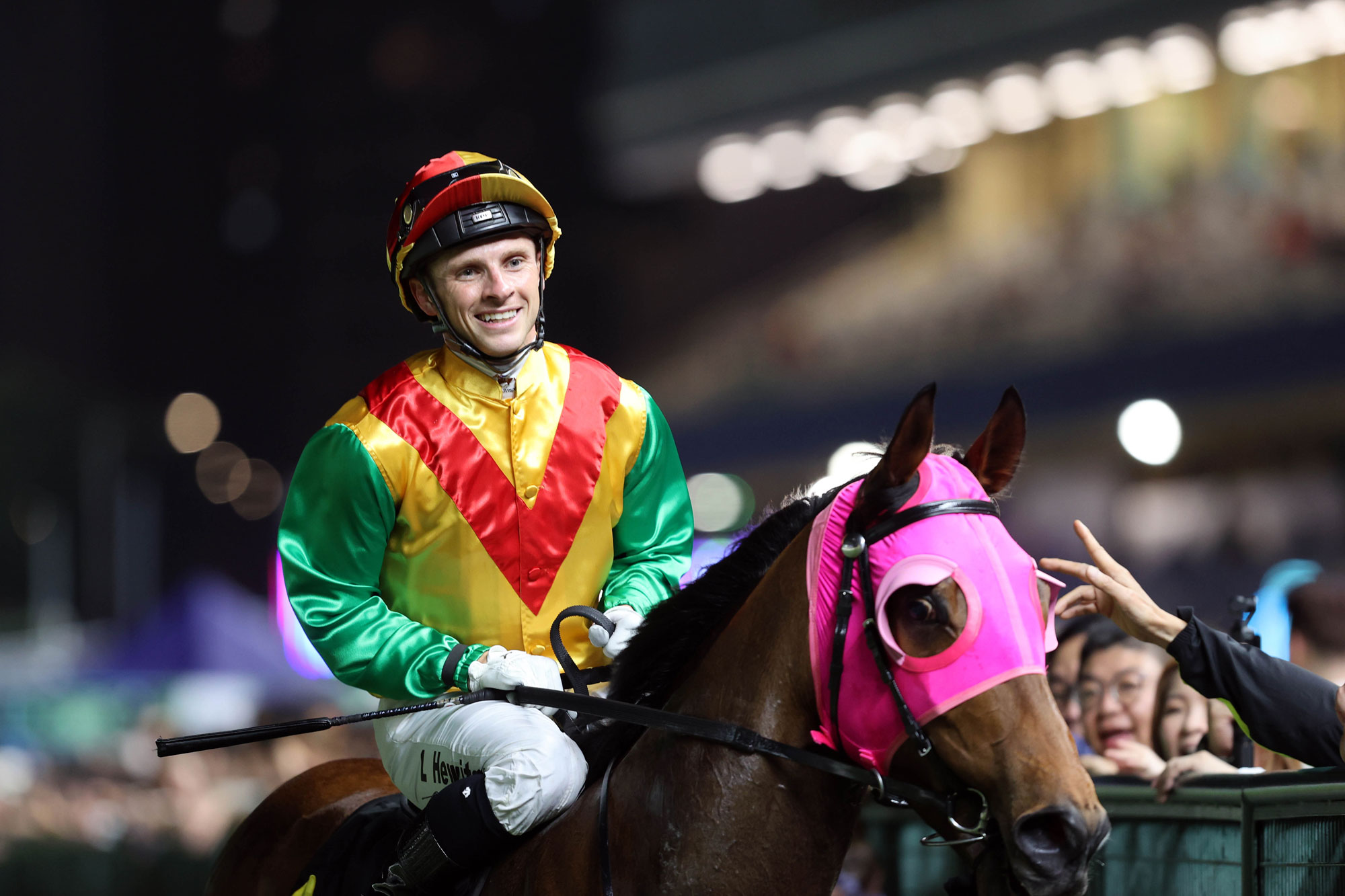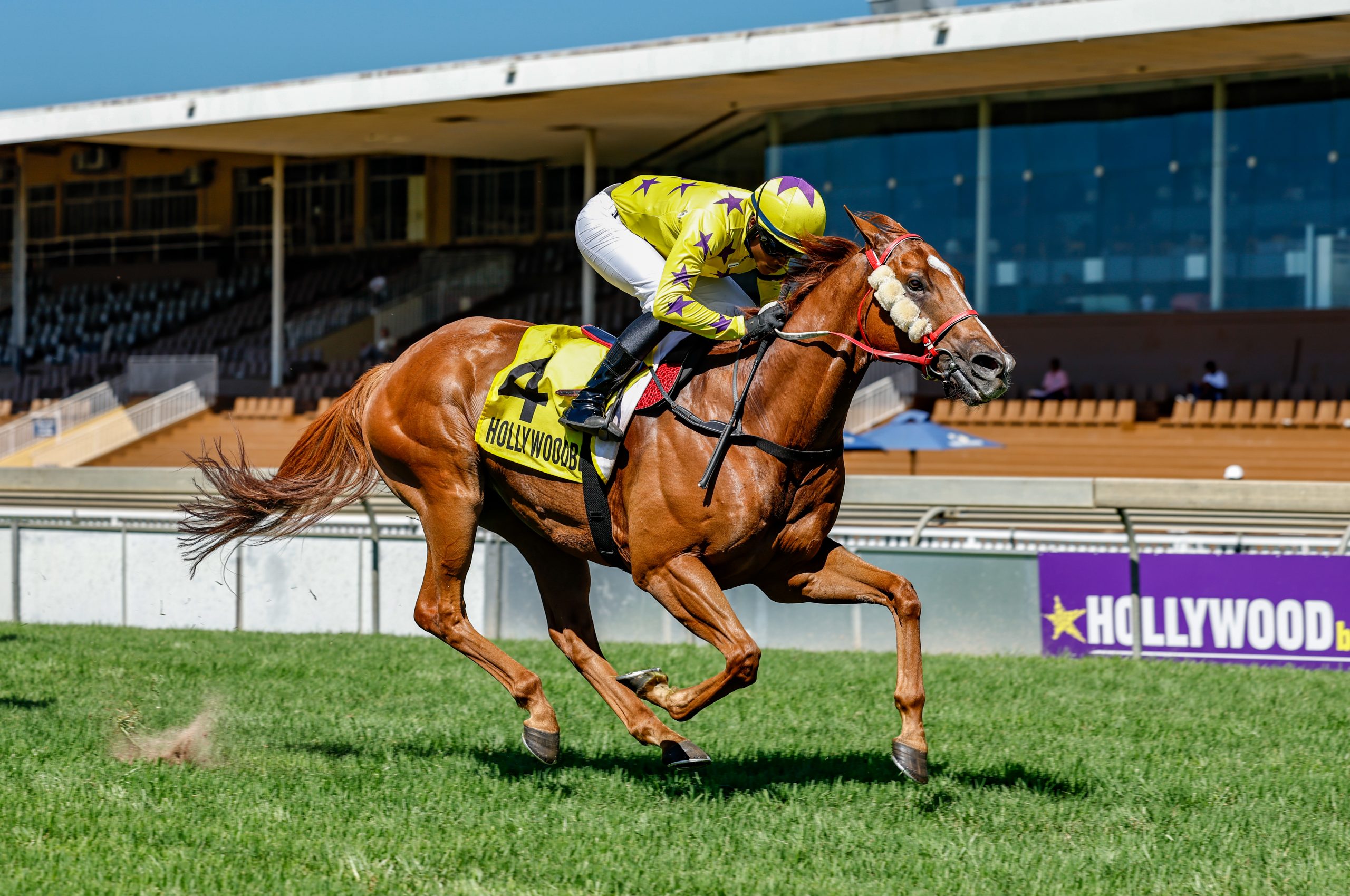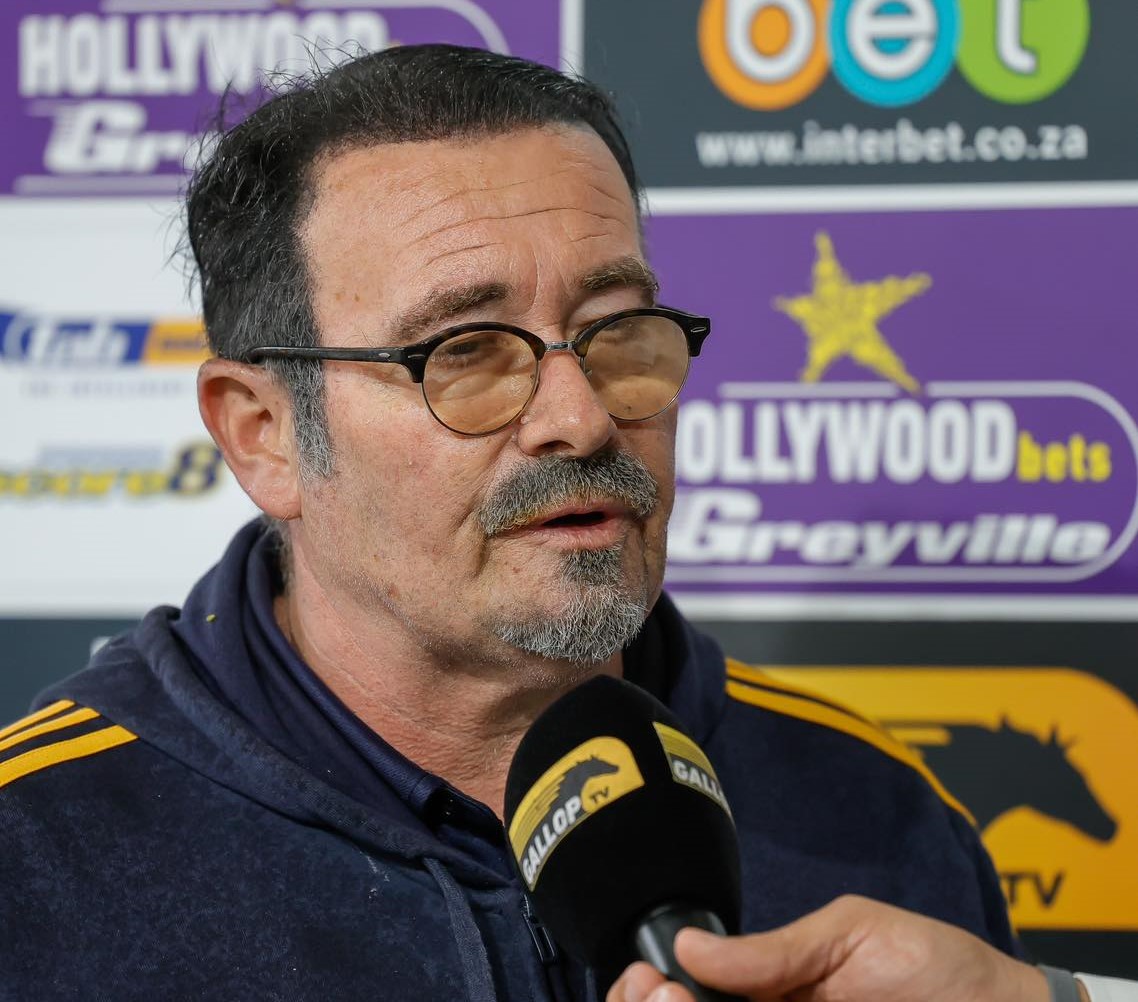While the Asian Racing Conference in India may have been a matter of the recent past, for those who are accustomed to hearing from Summerhill and Mick Goss on a regular basis, the deafening silence from those quarters may have mystified the folk who were not aware that he had returned from India in a very poor state of health that has seen him confined to hospital three times already.
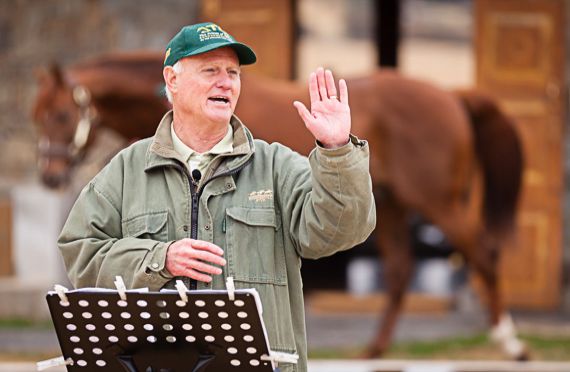
Mick Goss – hasn’t been well
He was discharged a fortnight ago and placed under ‘house arrest’ by his doctors who banned him from the daily activities of the business which are his lifeblood for the next four to six weeks.
The Sporting Post learns that, unfortunately, following further complications he was readmitted on Easter Sunday and remains hospitalised.
 We have received assurances though, that while Mick still has a long way to go, he gets stronger with the passing of every day and on his release from hospital, in conjunction with the Task Team, will still be attempting to make a contribution to the follow-up work that accrued from Team SA’s efforts at the Asian Conference, which was aimed at reinstating South Africa’s international export protocols so as to facilitate at last the normal movement of our horses out of the country.
We have received assurances though, that while Mick still has a long way to go, he gets stronger with the passing of every day and on his release from hospital, in conjunction with the Task Team, will still be attempting to make a contribution to the follow-up work that accrued from Team SA’s efforts at the Asian Conference, which was aimed at reinstating South Africa’s international export protocols so as to facilitate at last the normal movement of our horses out of the country.
It’s many years since this country enjoyed a wave of support from the international community for our protocols since the Conference and much of it has to do with the work of the remarkable team of scientists we now have on board, which has invoked the support of countries none of us expected to arise to our cause.
While Mick’s role will obviously be limited for the foreseeable future, Peter Gibson of Racing SA has already filed a full report to the Task Team responsible for this initiative, and under the chairmanship of Chris van Niekerk, a new battle plan is being formulated in anticipation of what lies ahead.
For what it’s worth, here is a transcript of Mick Goss’ speech at the Conference, which will have resonance with most South African horsemen:
“Chair, Ladies and Gentlemen
You can imagine my trepidation as a Zulu farmer, at the thought of addressing the intellectual elite and the business giants of the greatest racing conference on earth. I want you to know though, how grateful we are as a nation for the opportunity to do so.
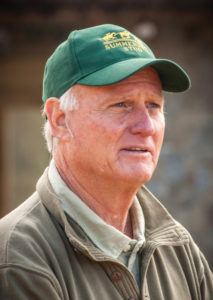
Twenty years ago almost to the day, I debuted as a speaker at this conference in this very room, and it’s a thrill to be back among so many good friends.
Thank you so much for inviting us; in particular I should pay our respects to Winfried Engelbrecht-Bresges, Andrew Harding and their people for their remarkable organisation, and to Cyrus Poonawalla and his Trojans for their unsurpassed hospitality.
I grew up in one of the remotest places in Africa, and until that time, I’d never been to India. Racing brought me here.
For that matter, I’d never been to the United States or Japan, Australia, New Zealand or Hong Kong. This great sport of ours took me there. It took me to Singapore, Malaysia, Thailand, Macau, Dubai, the Middle East, Argentina and everywhere else this great pastime has taken root.
No other endeavour in the world could’ve substituted the life racing has given us, and I dare say that goes for a good many of us in this room.
I’m here to share a few thoughts with you on South Africa’s place in the pantheon of the world’s quality racehorse producers.
When I first addressed you in 1995, we were home to 545 breeders, 158 stallions, our annual foal crop numbered north of 5000 and I still had a good crop of blonde hair.
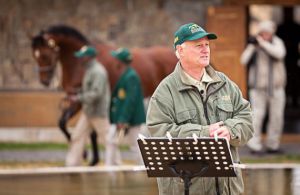
In 2014, there were 148 registered breeders, 103 stallions, 3400 foals and the decline has left me with very little hair.
There’s an old saying that if you want to go prematurely grey and lose your hair, get into horsebreeding or hospitality. I did both.
The attrition was partly due to the international financial meltdown, but much of it has to do with our frustration at the constraints on our exports.
It’s a tribute then, to the South African racehorse that despite the reduction in output and the extraordinary demands of our export protocols, our runners continue to excel on the racetracks of the world.
Since Mike de Kock first pioneered the plunder of the rich prizes on offer in Dubai 12 years ago, South African-trained horses have won 50%, or three of the six events on World Cup night on at least one occasion, and they’ve come home with a third (or 33%) of the spoils on a further four occasions.
These victories include 6 UAE Derbys, 4 Group One Sprints, 3 Dubai Turfs or Duty Frees and 3 Godolphin Miles.
By any standards, with a record that compares with the best anywhere, you’d have to say they’ve boxed well above their weight.
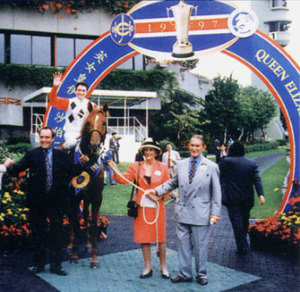
1997 QEII Cup
Besides, our fellows have won Group One races in the United States, the United Kingdom, Hong Kong, Singapore and Australia in the same time, and only last year Variety Club ranked in the top three racehorses in the world, with Vercingetorix among the top fifty.
It’s a fact, and I’m sure my good friends John Messara and Peter McGauran will be comforted by their knowledge of it, that the foundations of the great Australian breeding industry were laid with the arrival in Sydney in 1788 of 44 thoroughbreds aboard the First Fleet.
They came from Cape Town, so you can imagine what the mighty Australian racehorse might’ve looked like without its South African connection!
It seems that while there’s been a reduction in our numbers, there’s also been a concentration in the quality, due as much as anything to the vigorous levels of investment South African breeders have made in recent times in saluting the achievements of these horses.
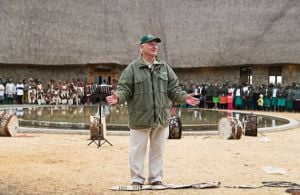
For all they’ve done though, they still represent the best value in the world.
To illustrate the point, the average price at South Africa’s two premier sales in 2015 was $21,367 and $38,437 respectively, compared with $200,372 in Australia, $294,973 in America, and $317,967 at Tattersalls in England.
At the same time, South African horsemen have been loyal and conspicuous supporters of all these international sales, as well as those at Goffs in Ireland and Arqana in France for decades now.
For 40 years, we were the biggest buyers of yearlings from Argentina, and we patronised New Zealand staunchly.
More recently, there’s been talk among our bigger owners of getting a slice of the Deep Impact pie in Japan and I have a mandate to speak with our Japanese friends while I’m here.
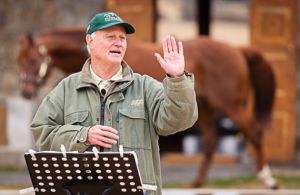 I’m sure you’ll concede, Ladies and Gentlemen, that we’ve more than paid our school fees.
I’m sure you’ll concede, Ladies and Gentlemen, that we’ve more than paid our school fees.
For all this, we continue to face major headwinds in getting our horses into the jurisdictions of our trading partners out of an apparent fear that we may export the African Horse Sickness virus.
To get a horse to the Dubai Carnival, for example, takes as much as 6 months, and then they’re expected to compete with the best, which remarkably they do.
While I don’t want to downplay the necessity of containing the disease, it’s worth mentioning that during the First and Second World Wars and those of the British empire before that, we exported more than 450,000 horses to those conflicts wherever they took place, without ever infecting the recipient countries.
Indeed, my friends, we have continued to export several hundred horses every year from the various equine disciplines at considerable cost and enormous inconvenience, without ever transmitting the disease anywhere.
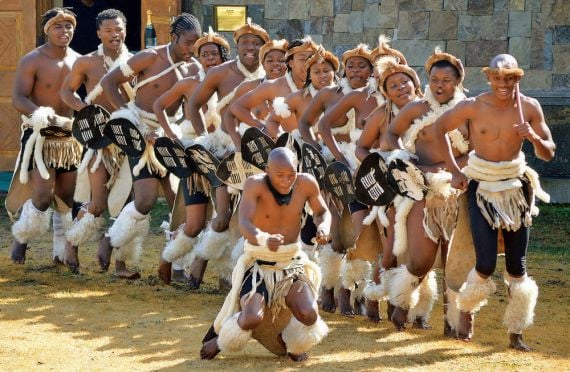
It’s puzzling to me, your Zulu farmer, that despite the technological age and the vast investment we’ve committed to our export facilities, it’s now more problematic than it’s ever been to get a horse out of South Africa.
For that reason, I would invite you to listen to the address of Dr Evan Sergeant of Australia, who speaks in place of Dr John Grewar, at tomorrow’s movement session to hear what we’ve done to bring complete comfort to those who have any reservations.
It seems to me though, that for those of us who reside at the southernmost tip of what the civilised people in the north call the Darkest Continent, it’s sometimes necessary for us to recall our scientific and business credentials in order to inspire some confidence.
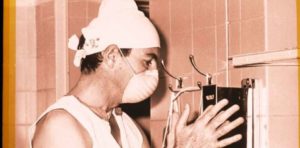
Pioneer Dr Chris Barnard
So forgive me reminding us all that South Africa gave the world its first heart transplant almost 50 years ago; while it’s not everyone’s favourite topic at present, more than two decades ago, we produced an atomic bomb then gave it up and dismantled it without any fuss; the World Economic Forum’s recent survey of the world’s most admired people included three in the first four with South African connections, one of whom, now in America, is at the forefront in the development of carbon-free motor cars and is a world leader in space exploration.
Ironically, it seems on the one hand he’s trying to save the planet, while on the other, he’s found a way to leave it. Also according to the World Economic Forum, for the fifth year in a row, South Africa’s auditing and reporting standards were ranked first in the world, while our financial institutions were 8th out of 140 countries in the Global Competitiveness Survey.
It’s a fact too, that our little country has produced more world class companies than any other of its size. In a nutshell, we have a vibrant private sector, and several of them have put their shoulders squarely behind our export initiatives, as has our government.

Good ole days! Summerhill’s Mick Goss, the late Graham Beck, Cheryl Goss and another legend in the late Laurie Jaffee
Racing, as I said earlier Ladies and Gentlemen, has taken my wife, Cheryl and I to faraway places, and like most of us, it has made us many close friends. It has taken us to the top of the mountain many times, and it has sat us down with the Queen Of England.
Racing has shown us that all of us, no matter our beginnings, can make a name for ourselves in this game, and sometimes aspire to excellence.
Above all, racing has taught us that you only live once. But if you do it right, my friends, once is enough.
Within the four walls of this great room, there is enough political power and scientific influence to assist the South African racehorse in reassuming its rightful place on the racing circuits of the world. For that to happen though, we need your vote.
Just once.”
Summerhill pics – kind courtesy HamishNiven Photography






